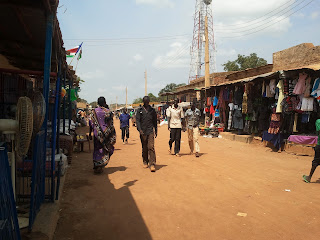Wau and the South Sudanese
Culture
The city of Wau is located in the North West of South Sudan, on the western bank of the Jur River. During the years of the conflict the city served as a base for the Khartoum armed forces. The city has always been culturally, ethnically, religiously and linguistically diverse. In the last year, since the independence, the city has changed quite a bit; many people from the Arab North have left while many South Sudanese from different tribes returned. A large part of the population here belongs to the Dinka ethnic group, which is the largest and most dominant tribe in South Sudan. They are easy to spot because, often they have large scares on their faces. Some have 6 lines on each side of their forehead; some have 6 or even 12 scares in a shape of kind of rings going all around their head. Women usually have dots or stripes on their cheeks and lines on their chest. I noticed it first on the man who served me food in a local restaurant, and then I started to realize it is common when I saw it on both young boys and older man all over the city. Unable to resist my curiosity I decided to risk the possibility of upsetting cultural sensitivity and asked. Luckily, it went well and the person was happy to answer. The scares are a part of a ritual that transforms you from a child to a man. It usually also accompanied with the removal of two of your front bottom teeth. The scars and the removal of the teeth symbolize braveness and maturity, men usually do it around their teenage years and if they haven’t done it they will be often viewed as a child. I’ve been told that if men don’t have the scars and his teeth haven’t been pulled out he will often find it harder to find a wife.
It is amazing for me to find out about the local culture, attitudes and perception, the story of the ‘Dinka Scars’ is just a small part in a complex, multilayered society. Alongside that ‘inside’ culture I also learned that there are powerful perceptions that stand in relations to the 'others'.
On my first day in the city I decided to go for a little walk around. I guess people are not used to see a foreign girl walking around by herself, especially in that part of town. The people stopped to greet me, saying ‘how are you?’ or more often ‘whats up?’ and laugh, while the kids simply starred at me. I felt a bit awkward to be the center of attention, but I guess here it is only natural that I will stand out. At some point of my little walk two boys approached me, they were really nice and they simply said that they want to talk to me. They asked about me about myself and what I do here and told me that they recently returned after living in Uganda in the last years because of the war and that they are now studying economics at the University of Wau. They were very proud to be in South Sudan and very proud to be Dinka. They said that in Uganda they have often been mocked because of their dark skin compared to the Ugandans. I was surprised by this new insight, but much more surprised with what they told me next. Noticing my discomfort by the starring passerby’s, they said I should be proud, that people here look up to the white man. That I shouldn’t worry because ‘if you are white you are better’. I was puzzled, for me we are all people I said. They responded that this is the mentality of the African man, always looking down at himself, believing he is less worthy. It got stack in my head and I have to wonder if we did this to them? Suppressing them for decades and decades until they believed in this twisted hierarchy themselves?







Dear Mor, we don't know us personelly, I'm Eva, a friend of Philips family.
ReplyDeleteI'm very impressed from your project in South Sudan. Wish you amazing moments and treatments, you will never forget this time I think.
Thank you for sharing your experiance. Greetings from Lienz Eva :)